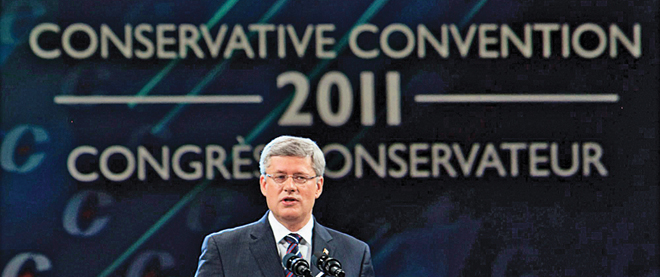When Tories agree to disagree
Paul Wells on how Harper told his party that Canadians think like they do. The hubris was almost Liberal in its scope.
Fred Chartrand/CP
Share

My Big Book of Columnists’ Clichés contains only two templates for covering a political party convention. That’s all we need, usually. The first carries the suggested headline, “Internal division splits a once-great party in two.” The second is headlined, “Party brass clamps down; well-oiled machine squeezes out dissent.” Just pick the form that fits, fill in a few blanks, and you can be at Hy’s by 5.
Unfortunately, last week’s Ottawa convention of the Conservative Party of Canada didn’t fit either of the Big Book templates. A few commentators tried to squeeze it in under Well-Oiled Machine, but it didn’t really fit.
Conservatives gathered for the first time since they met in Winnipeg in 2008. It was the party’s first important event since Stephen Harper won his majority on May 2. The PM was in a good mood. He spent a surprising amount of time onsite. On Friday night he skipped an NHL playoff game so he could party-hop. The delegates were in a good mood. Reporters were free to wander around the convention floor unhindered. Even Terry Milewski.
Clamp down? On important questions it was hard even to find a party line. The debate that got all the press attention was over rules for selecting a future leader. Should every riding get an equal number of votes as it did when Harper became leader in 2004? Or should ridings lose clout if their membership fell below a given threshold?
The question was heavy with symbolism. The equal-riding group included Peter MacKay, who demanded the equal-riding rule as the price of unifying his Progressive Conservatives with Harper’s Canadian Alliance in 2003. Alberta riding associations had, and have, huge memberships; in Quebec and the Atlantic, membership rolls were shorter.
Behind MacKay at the microphone in the closing plenary was a group who’d sit today as the Progressive Conservative caucus, if there were still such a thing. Mike Chong, every Liberal’s favourite Conservative leadership hopeful. Pierre Claude Nolin, whom Brian Mulroney put in the Senate, a fan of marijuana legalization. Opposing them were a group of not-particularly-Progressive Conservatives, including Doug Finley, a key campaign organizer for Harper.
Finley warned that the equal-riding system makes it easy to steal a leadership race by stacking riding associations in underpopulated ridings. Then the vote came and Finley lost big. The MacKay group won a clear majority of delegates’ support, repeating a similar victory on the same issue at the party’s Montreal convention in 2005.
Now here’s the thing. A control-freaking, risk-averse party would have done whatever it took to keep a key Harper operative from openly disagreeing with the minister of national defence on a convention-hall floor. But this division was no big problem because it wasn’t symptomatic of deeper, more pervasive division. Having clashed on this question, the Conservatives divided in other ways on other issues. There were no durable fault lines. Opponents on one question found themselves allied on another.
Most of the motions I watched carried with 30 or 40 per cent of delegates opposed. It was a change from New Democratic Party conventions I’ve attended, where proposals often pass with near-unanimous support. (At Liberal conventions, policy plenaries were never much of a draw. Which may explain some things.) There was real debate here, but its contours shifted depending on the question. When a party functions like that, its members feel a stake in it because nobody is consistently frozen out. It’s an important strength.
But this party’s heart still beats on the right. On the convention’s first night the keynote speakers were John Baird, Jason Kenney and Stockwell Day. Kenney and Day would not have been allowed anywhere near the stage at a convention under the leadership of Mulroney or Joe Clark. Peter MacKay did manage to get to the microphone—just long enough to thank Day, who didn’t run for re-election, for his years of public service.
Harper’s Friday-night speech emphasized that victory is not his party’s only purpose. “By saying what we will do and doing what we say, one step at a time, we are moving Canada in a Conservative direction,” he said, “and Canadians are moving with us.”
He talked about lower taxes “for kids’ sports and artistic activities, for students, tradespeople, immigrants, transit users, volunteer firefighters, caregivers, for seniors.” That list of entitlements has made a mess of the tax code, but it makes for a long list of Canadians with a stake in Conservative government. He talked about strong armies and tough justice. He drew a distinction between reducing taxes “permanently” and raising spending “temporarily.”
“After all these years,” he said, “I can stand before you and tell you this: Conservative values are Canada’s values.”
It was a bold line. Familiar too. “I believe that this election has seen the creation of a new, durable and diverse Conservative electorate for a very simple reason,” Jason Kenney told the same room a night earlier. “Because Conservative values are Canadian values.”
For chutzpah, the line was matched only by Kenney’s claim, a moment later, that as Conservatives, “we have the immense advantage of seeing things as they are.”
The hubris was a lot to swallow, until I remembered that Liberals used to tell themselves the same tales, often in the same convention centre. Conservatives have put the old feuds behind them. They are free to disagree, politely and fleetingly, because they are at last free to govern.